National Investigation Agency
Establishment of the National Investigation Agency (NIA)
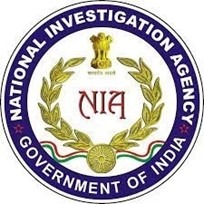
Background:
- The NIA was established in 2009 through the National Investigation Agency Act, 2008, primarily in response to the 2008 Mumbai terror attacks (26/11).
- It serves as the central counter-terrorism law enforcement agency in India, aiming to address the urgent need for a federal agency to manage terror-related crimes.
Headquarters and Structure:
- Headquarters: New Delhi, with branch offices in several key cities including Hyderabad, Guwahati, Mumbai, and others.
- Operates under the Ministry of Home Affairs and is led by a Director-General, appointed by the central government.
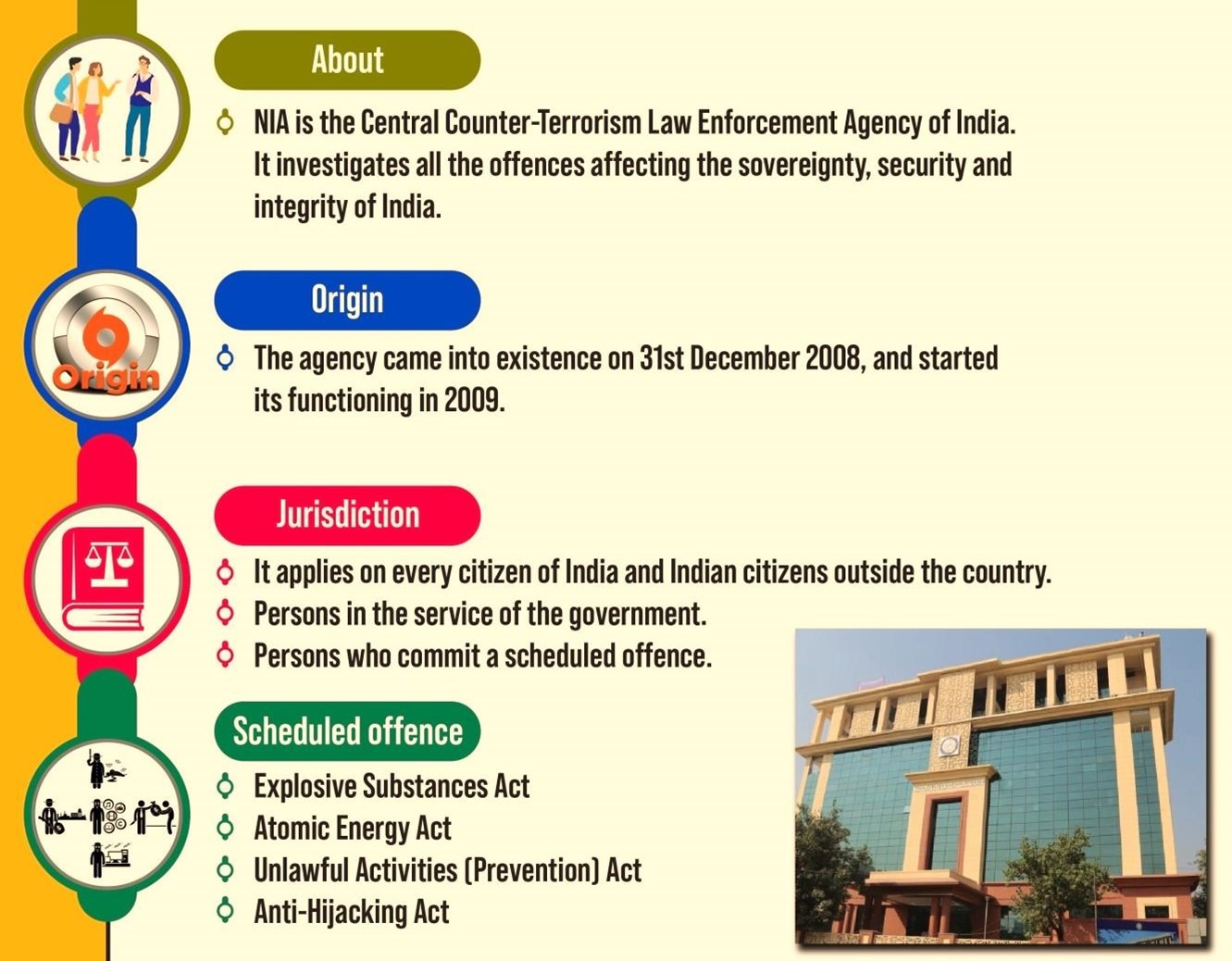
Rationale for Establishment
The Government of India emphasized several reasons for creating the NIA:
- India has been a victim of cross-border terrorism and numerous terrorist incidents affecting various urban and rural areas.
- Many terrorist activities have complex inter-state and international linkages, including connections to drug and arms smuggling.
- Recommendations from expert committees and the Second Administrative Reforms Commission highlighted the necessity for a dedicated agency.
- The NIA was conceived to operate within a concurrent jurisdiction framework, allowing it to take up designated cases.
Functions of the NIA
The NIA is tasked with:
- Investigating and prosecuting offences under various specified Acts.
- Collecting and analyzing intelligence on terrorism, collaborating with other agencies.
- Implementing measures for effective enforcement of the NIA Act provisions.
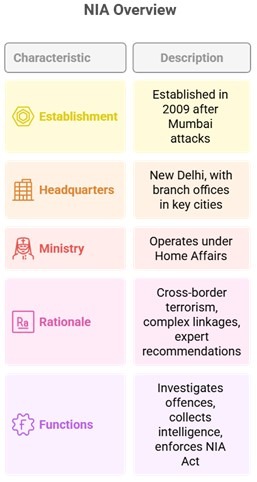
Vision and Mission
Vision:
- To become a professional investigative agency adhering to international standards in counter-terrorism.
Mission Objectives:
- Conduct thorough investigations of scheduled offences with leading scientific techniques.
- Ensure swift and effective trials.
- Uphold the Constitution and protect human rights while maintaining professionalism.
- Regularly train and update staff on best practices.
- Foster cooperative relationships with other law enforcement agencies.
Jurisdiction
The NIA has jurisdiction over:
- Offences affecting India’s sovereignty and security, including terrorism-related activities, hijackings, and threats concerning nuclear installations.
- Following the NIA (Amendment) Act, 2019, their jurisdiction was extended to cover:
- Human trafficking
- Counterfeit currency
- Cyber-terrorism
- Prohibited arms-related activities
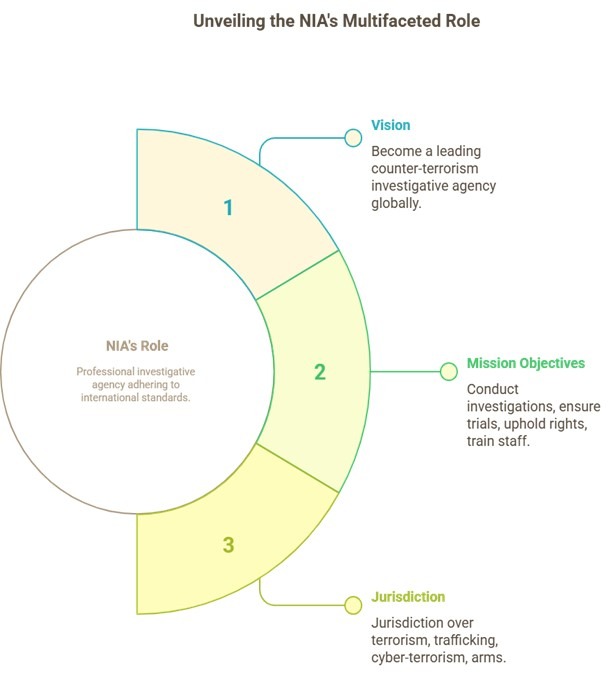
The SC clarified that the NIA can probe offences under the NDPS Act, 1985 (not scheduled under the NIA Act) if they are connected to offences under the UAPA, which is scheduled under the Act.
Scheduled Offences Under NIA Act, 2008:
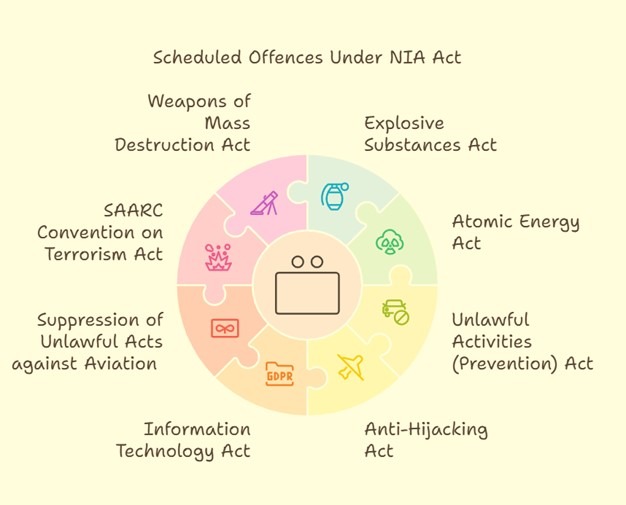
NIA (Amendment) Act, 2019
Key provisions of the amendment include:
- Extension of NIA’s jurisdiction to cover offences committed against Indian citizens outside India.
- Equipping NIA officers with powers akin to police officers in India and abroad.
- The central government can mandate the NIA to investigate offences committed outside India.
- Provision for the designation of Sessions Courts as Special Courts for trials under the NIA Act.
- Inclusion of new offences in the NIA’s schedule.

NIA Special Courts
- Establishment: NIA Special Courts are established by the Central Government for the trial of Scheduled Offenses in accordance with Sections 11 and 22 of the NIA Act 2008.
- Composition: These Special Courts are presided over by a judge appointed by the Central Government based on the recommendation of the Chief Justice of the High Court.
- In cases where it is deemed necessary, the Central Government can appoint additional judges to the Special Court, also upon the recommendation of the Chief Justice of the High Court.
Jurisdiction of Special Courts:
- Powers of Special Courts:Special Courts are vested with all the powers of a court of sessions as per the provisions of the Code of Criminal Procedure, 1973.
- Jurisdiction Issues: If any question arises regarding the jurisdiction of a Special Court, the matter is referred to the Central Government,and its decision on the issue is considered final.
- Case Transfer by the Supreme Court: In exceptional cases where a peaceful, fair, impartial, and swift trial is not feasible, the Supreme Court can transfer a case from one Special Court to another within the same state or to a Special Court in a different state.
Criticisms and Challenges of NIA
- Concerns about human rights: There have been concerns raised about potential human rights violations during investigations, particularly regarding the use of coercive interrogation techniques.
- Overreach: Some argue that the NIA’s powers are too broad, leading to potential misuse and infringement of civil liberties.
- Resource Constraints: Like many agencies, the NIA faces challenges related to resource allocation, including funding, personnel, and technological capabilities.
- Issues of federalism: It was contended that the centre enjoys more power under the said Act, which is why there is potential for the centre to interfere in the functions of states politically.
Way Forward
NIA should cooperate with State governments, irrespective of their political affiliation, and win the long term confidence of ordinary people by providing expeditious justice.
Independent professionals from outside must be hired to include in the decision making process of deciding whether the NIA should investigate a certain Scheduled offence to avoid maintain integrity and impartiality.
To make NIA different and much more effective, its shortfalls must be debated openly and honestly. It should draw in a variety of voices, and incorporate checks and balances that will minimise the possibility of failure.
It should be given necessary powers to prevent the enumerated offences rather than simply powers of investigation and enforcement. It should be allowed to share, collect, collate, analyse and disseminate the intelligence with other intelligence agencies to integrate and enhance India’s security system.
India’s security perspectives would inevitably be governed by the interplay of its domestic imperatives, regional balance of forces and the global challenges which impinge on its role and capabilities. An overarching framework of India’s national security has to take cognisance of military and non-military dimensions in terms of both external threats and internal challenges to its territorial integrity and national unity. Threats to a nation emanate as much from external aggression as from internal strife but at times internal factors can erode national security more critically than any external danger.
In this significance, a strong and independent National Investigation Agency can make Indians more secure by addressing the gaps in our current approach to preventing and investigating offences with a transnational character.
